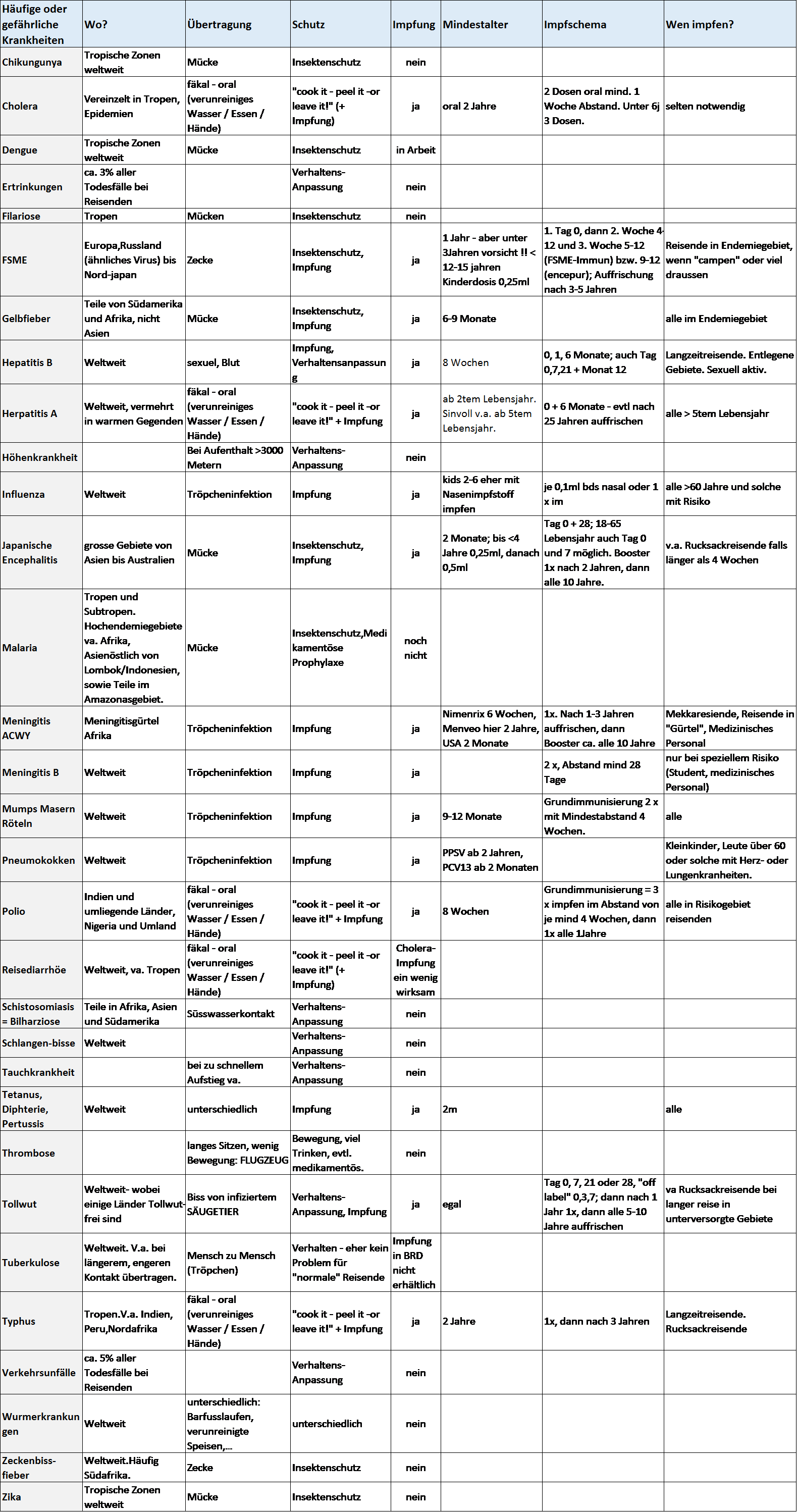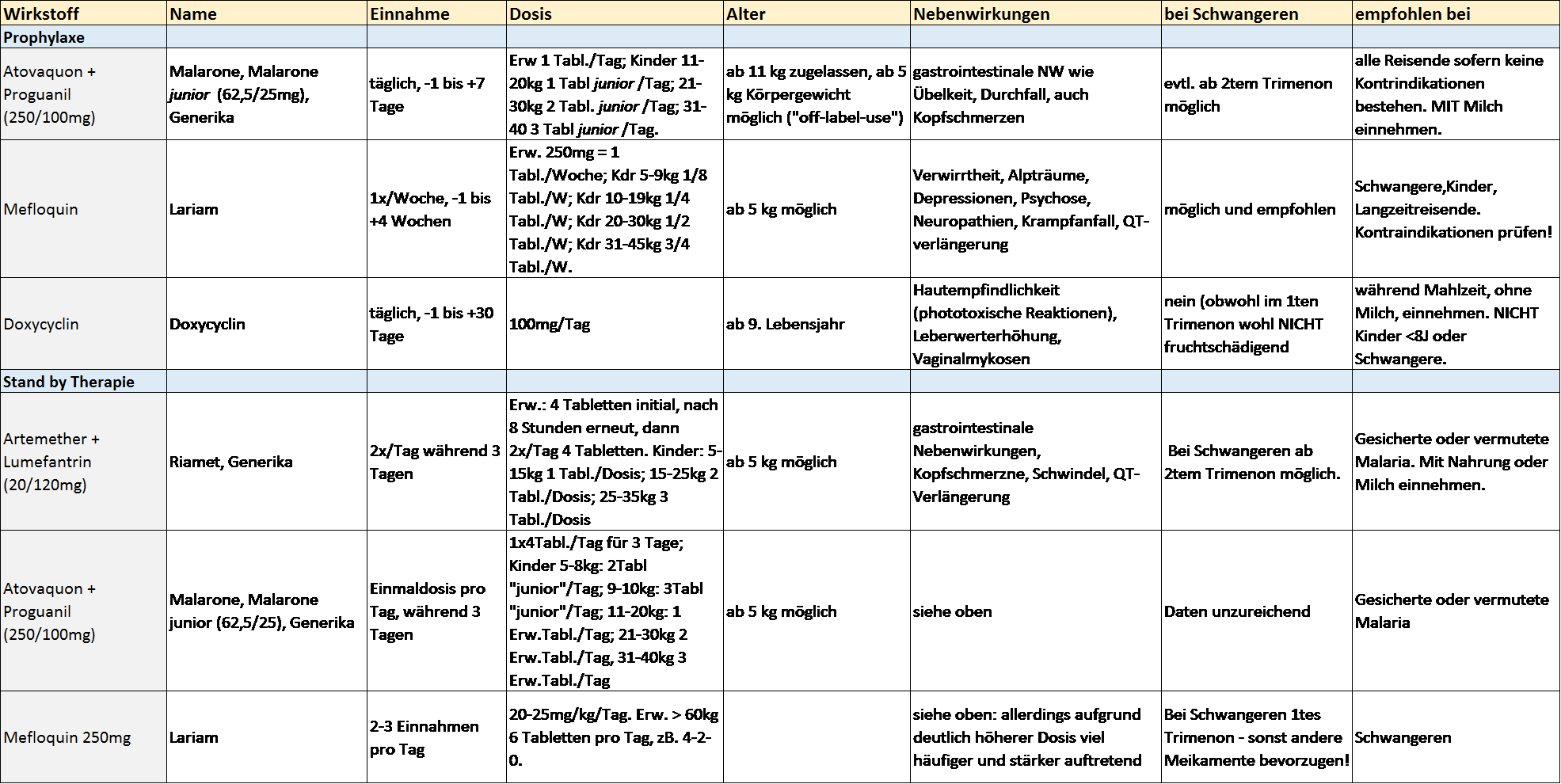Travel medicine and yellow fever
Travelling abroad to the tropics is very popular. However, you should inquire about possible dangers that may vary depending on the destination before you leave. Infectious diseases should be mentioned here, which can be avoided to a large extent by certain measures of precaution. The aim of the travel counselling is to familiarize you with these measures, which, in addition to common sense, may include vaccinations, prophylactic medication and good mosquito protection.
Before I moved to Trier, I worked for many years at the Institute of Infectious and Tropical Medicine at the Ludwig Maximilian University in Munich (until 2010), where travel medicine advice and the treatment of returnees was our “daily bread”. Afterwards, I continued to work as a doctor in tropical countries for many years: Burundi, Nicaragua, La Réunion, French Guiana. Travelling is a passion, and I find tropical diseases fascinating. I would be happy to advise you on how to enjoy one and avoid the other.
Your itinerary will be used to determine whether there are any particular infection risks and how they can be prevented. Please bring your vaccination certificate with you so that the current vaccination status can be assessed and, if necessary, completed. This is a good time to make up for vaccinations that are recommended in Germany and not sufficiently “refreshed”. In addition, necessary vaccinations can be carried out immediately, since we usually have the necessary vaccines in stock. We always try to buy them as cheaply as possible for you – often in Luxembourg.
If a malaria prophylaxis makes sense, we will write down the appropriate medication.
It is recommended that you come to our consulting hours 6 weeks before your departure. However, some preventive measures are also possible for last-minute travellers.
If you do not feel healthy after your return, we will help you with the right diagnosis and treatment.
The travel vaccinations are not normally paid for by the health insurance companies. However, many health insurance companies cover the costs if you have been advised by a qualified travel physician. As a rule, the traveller pays the invoice first out of his own pocket and then submits it to the health insurance company for reimbursement
LINK: Table with overview of the various health insurance companies can be found here)
Travel medicine advice can be given at the following times:
Monday, Tuesday and Thursday from 7 a. m. to 12 noon; Friday from 9 a. m. to 1 p. m. Also on Mondays from 16-19 o’ clock, and every other Thursday from 16-19 o’ clock. Appointments outside these hours are possible after consultation.
some explanations about important diseases
Malaria
Malaria occurs in many tropical countries. The pathogen, plasmodium, is transmitted by mosquitoes (anopheles), which are mainly active at night. If untreated, treated too late or incorrectly, certain forms of malaria can be rapily fatal ; Therefore malaria prophylaxis should be carried out in some countries in addition to a consistent mosquito protection. One takes a malaria medication before, during and after the trip, which makes an infection very unlikely.
The following are possible choices: Atovaquon/Proguanil (Malarone), mefloquin (Lariam) and the antibiotic doxycycline. Which medication is best for you will be discussed during the consultation.
In some areas, a so-called “stand-by” prophylaxis is sufficient: Here, one takes a medication to be able to treat oneself in case of a malaria infection.
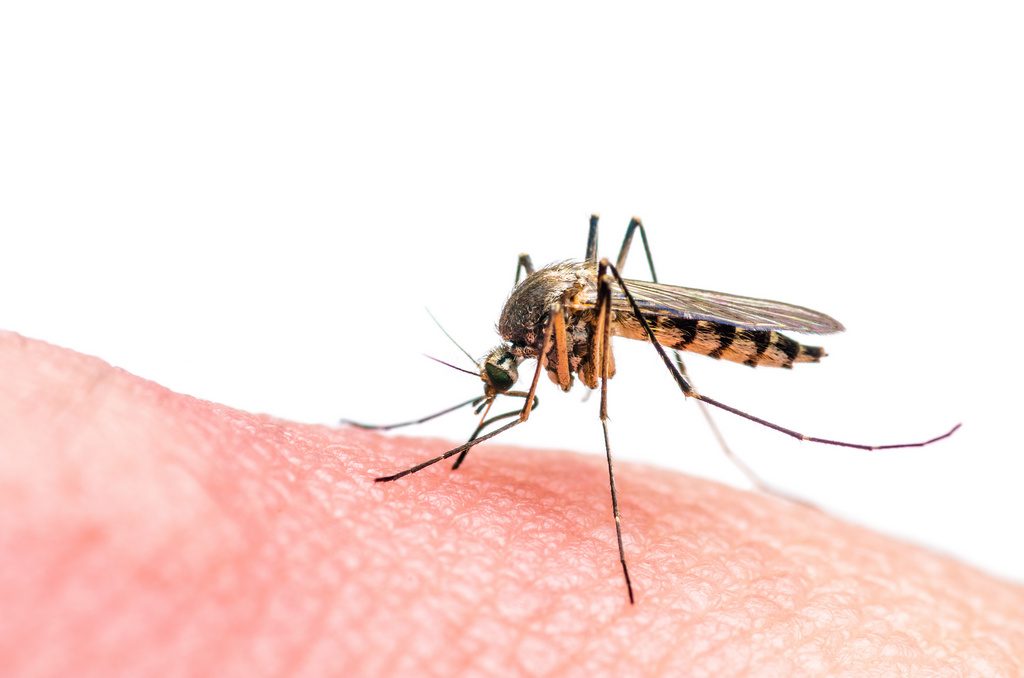
Yellow fever
Yellow fever continues to be a life-threatening infectious disease for which there is no specific, effective therapy. This viral infection occurs in 47 countries, including sub-Saharan Africa and Central and South America. Approximately 200,000 cases of yellow fever occur each year worldwide – including an estimated 30,000 deaths.
The disease is caused by viruses transmitted to humans by mosquitoes that are active day and night.
In many countries, vaccination against yellow fever is compulsory. This also applies to travellers, who are not allowed to enter the country without a current yellow fever vaccination certificate. A valid vaccination certificate (= official validity) begins 10 days after the vaccination. Apart from the obligation to vaccinate, protection against the disease in yellow fever areas by effective vaccination is, of course, sensible and generally recommended. Nevertheless, a good mosquito repellent should not be forgotten.
It is now known that a single dose of yellow fever vaccination is sufficient to protect against yellow fever for life – just recently, vaccination had to be carried out every 10 years. Since July 2016, the International Health Regulations (IGV), which provides for a one-time yellow fever vaccination, has come into force. However, the regulations have not yet been changed in many countries. Therefore, it is advisable to inform yourself about the current regulations at an authorised yellow fever vaccination centre or the embassy of the country of entry when travelling to countries with yellow fever vaccination regulations (also transit).
Since yellow fever vaccination is a live vaccination, a weakened but live virus is administered, pregnant women and people with immunosuppressive diseases or therapies must not be vaccinated.
As an approved yellow fever vaccination centre, we will be happy to check the necessity of such a vaccination before your trip and carry it out on site.
pregnant women and travelling
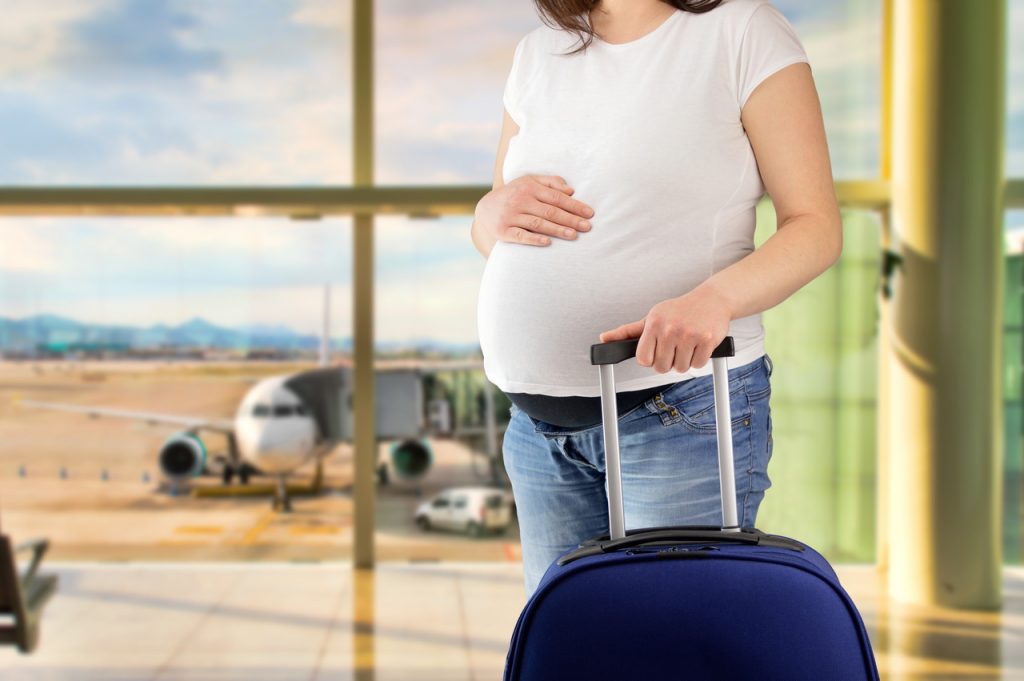
Pregnant women are often advised against travelling to tropical and subtropical areas. It is often considered as “completely irresponsible!”
For example, malaria infections in pregnant women are much more likely to show a fulminant course of infection. The same applies to hepatitis E infection (20% mortality in pregnant women!). In general, any infection can cause premature labour and even premature birth or abortions. Some infections can lead to malformations – this applies mainly, but not only, to women who have not yet had contact with toxoplasmosis or CMV (cytomegalovirus). The therapy of an infection is also often much more complicated, as many drugs are not suitable for pregnant women.
In Germany, too, health problems often arise during pregnancy: Do you want to be in a country with poorer medical care?
That was just a small selection of many good reasons not to travel in this special time.
However, the following point of view can also be taken: In tropical countries there are many millions of women who bring millions of healthy children into the world! It can seem a bit strange or condescending to think that it is irresponsible to travel there as a pregnant woman…
I would be pleased to give you detailed advice on this diverse and exciting Topic.
Moskito repellent
While malaria is transmitted by mosquitoes, which predominantly take their blood meal at dusk and at night, there are a number of diseases transmitted by mosquitoes which are also active during the day (dengue, yellow fever, zika, Japanese encephalitis).
A good mosquito repellent can be achieved by taking as many of the following advices as possible into account:
- Sleep under insecticide-impregnated mosquito nets.
- Rub the uncovered skin with mosquito repellents: DEET 30-50% or Icaridin.
- Wear skin-covering, light-coloured, impregnated clothing.
- Stay in mosquito-proof rooms.
- Insecticidal sprays or spirals
- Do not rely on amulets, garlic or other such things…
first aid kit
The first-aid kit naturally includes all the medicines you take regularly. Depending on the type and destination of the trip, the following may also be useful:
- sunscreen
- dressing material and skin disinfectants
- painkiller (ibuprofen or paracetamol)
- Diarrhoea agent (electrolyte powder, loperamide)
- Water treatment tablets
- remedy for travel sickness
- insect repellents
- antipruritic gel against insect bites
- medicines for allergies (antihistamines)
- In some countries antimalarials and mosquito nets
- For a few: Antibiotics
- Depending on the medication carried: Certificate
- Do not forget to bring spare glasses/contact lenses!
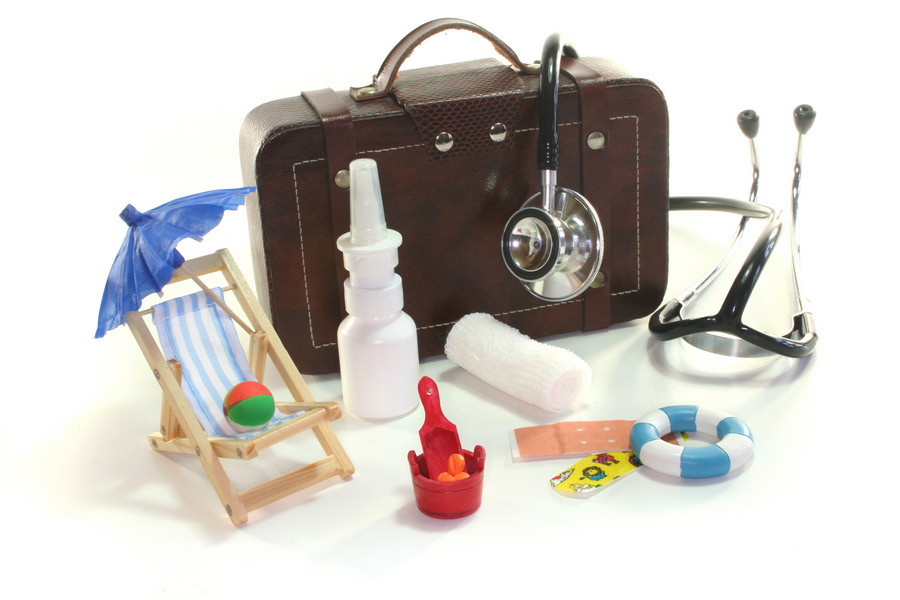
appointments
Travel medicine advice can be given at the following times:
Monday, Tuesday and Thursday from 7 a. m. to 12 noon; Friday from 9 a. m. to 1 p. m. Also Mondays from 16-19 o’ clock, and every second Thursday from 16-19 o’ clock. Appointments outside these hours are possible after consultation.
useful links
Deutsch
- Übersichtliche Informationsseite zum Thema Reisen: https://www.fit-for-travel.de/
- Welche Krankenkassen übernehmen welche Impfungen?: http://crm.de/krankenkassen/kk_tabelle_kassen.htm
- Auswärtiges Amt mit Infos zu jedem land: http://www.auswaertiges-amt.de/DE/Startseite_node.html
- Deutsche Tropenmedizinische Gesllschaft: https://www.dtg.org/empfehlungen-und-leitlinien/empfehlungen/impfungen/impfrisiko-aufklaerung/uebersicht-der-reiseimpfungen/248-gelbfieber.html
- Deutsche Tropenmedizinische Gesellschaft:Infos zu off label use:
https://www.dtg.org/empfehlungen-und-leitlinien/empfehlungen/impfungen/fuer-aerzte.html
English
- Nice site about all things related to travelling: http://www.fitfortravel.nhs.uk/home.aspx
- The famous Center for Disease Control travel-website: https://wwwnc.cdc.gov/travel/
- UK based travel information site: https://travelhealthpro.org.uk/countries
French
- Institut Pasteur avec recommendations concernant les voyages: https://www.pasteur.fr/fr/centre-medical/preparer-son-voyage
Portugues
espanol
This post is also available in: FrenchGermanPortuguese (Brazil)

